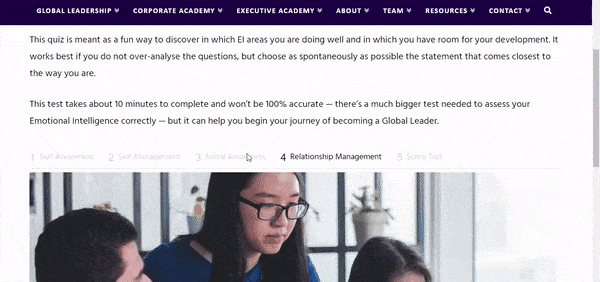“To me, global leadership is extreme leadership... just like extreme sports.”
Dr. Joyce Osland, global leadership expert
Becoming a successful global leader requires a fiercely intentional process that few are adequately prepared for. Dr. Osland’s words ring as true as a bell; global leadership is not an easy road to walk. It’s not enough to bulldoze your way through business strategy and hope that the people you lead will simply fall into line.
With so many different factors at play, if global leaders and the companies they work for fail to prepare, they prepare to fail. The results speak for themselves; poor staff engagement, high staff turnover, general confusion across the company, and a bottom line that’s affected negatively. Programs of change get abandoned, good ideas get lost in the ether and resources are wasted.
If this sounds familiar, then realize this…
You aren’t alone.
Let’s have a look at a case study by the Harvard Business Review and pull out some obvious issues and how it is that global leaders might avoid them.
First… a quick summary.
Contents
- Case Study Summary
- Problem 1: Misunderstanding The Cultural Landscape
- Problem 2: ‘The Argos Way’
- Problem 3: Donaldson’s Unwillingness To Learn
- Problem 4: A Belief That Cultural Intelligence Can’t Be Taught
- Problem 5: Lack of Structured Global Leadership Development
- Learnings from Donaldson
- Challenge 1: Distinct Lack Of Self Awareness
- Solution 1: Reflection Exercises
- Challenge 2: Distinct Lack Of Cultural Intelligence
- Solution 2: Understanding The Impact Of Culture
- Challenge 3: Poor Communication Of The Vision
- Solution 3: Scrap the One-Size-Fits-All Delivery
- Don’t miss our weekly emails
Case Study Summary
This case study is the tale of three high-level executives from the United States titan Argos vs a group of incohesive European managers from their various acquisitions. Frank Waterhouse, CEO of Argos Diesel, has been working furiously for the last four years in Europe. Argos now had several companies under its umbrella and Frank had been busying himself with getting new contracts from various different governments; in short, he’s Argos Group’s shining star.
Acquiring new companies to join the ever-growing Argos portfolio is easy. Integrating the teams and aligning so many different visions together is another animal entirely. International Argos CEO Bill Loun said he had the perfect guy for the job. As a professor for American Studies in Cairo for 5 years, he had international experience. He then joined Argos in the States and pulled together a fantastic training program that brought all the cross-divisional teams together in record time. Costs came down, productivity went up. He was one of Argos Group’s rising stars and would be an excellent aide to Frank.
Enter Bert Donaldson. He arrives in Zurich with his family in tow excited to get his hands dirty and start the ball rolling. He’s got plans for these managers, and he’s determined to get everybody aligned to ‘The Argos Way’.
How Things Progressed
As time went by, Bert started to run into problems. The managers didn’t seem to be responding to him at all. He felt like he tried it all; 1 – 1 meetings, training sessions, office lunch invitations. He’s asked for feedback and sent out questionnaires. All the responses didn’t give him any detail or move him any closer to bringing all these teams across Europe together. That’s assuming he got responses at all; a lot of the managers didn’t respond.
He held a huge progress meeting to discuss how things were moving forward and Bert had…nothing. No stats, no vision, no plan. They were halfway through an aggressively quick 2‑year program to bring the European managers together and they weren’t even close to getting started. In a defeated, frustrated panic, Bert phoned Frank to let him know that this presentation was going to be terrible.
Frank was annoyed at this point. The success of his own career was tied to Bert’s ability to deliver this program. If Bert failed, so did he. Once it became clear that Bert was struggling to get the European managers onside, Frank started asking questions.
The answers were damning.
- A close colleague said that the training sessions seemed to go okay but some managers felt patronized, and others felt that there wasn’t enough information. The trainers that Bert had brought in, turned up in casual dress to a formal business environment and got angry when one of the Norwegian managers asked ‘too many questions’. Bert’s right-hand lady, Frau Schweri, who helped him pull together the training programs advised against asking them to come back.
- Bert didn’t listen; the fact that the trainers turned up to a formal business training program in a Mickey Mouse sweater was none of his concern. People needed to get over it. On top of that, he insulted Frau Schweri by referring to her as his secretary. This woman was a training and development powerhouse, spoke 5 different languages and was both emotionally and culturally intelligent. She had years of experience in this field and was suitably outraged.
- The training always ran over, details like naming etiquette was overlooked. No opportunities for networking, no coffee breaks… it was a disaster. People were talking in the office. Bert never went home at a normal time, he always looked stressed and he seemed unable to get into the cultural swing of things. There were also whispers that his family was suffering too. They were in a new city, his daughter was in a new school but they were also struggling to adjust to such a vastly different lifestyle.
- Frank had noticed that Bert was struggling. He wrote to Bill Loun in the States and detailed that Bert was struggling to adjust to life in Zurich and struggling to mobilize the managers. Bill got straight on the phone and explained in no uncertain terms that Frank had to sort this out. Bert was the best that Argos had; this had to work. Frank’s career was on the line.

Would Frank give up on Bert and return him to the States? If he did, his career path would also take a hit and all the work he’d done for the past 4 years would be wasted. Bert’s career and reputation would potentially be destroyed beyond repair.
Frank broached the subject with Bert; Bert’s response made it clear that he had completely overlooked how the Europeans did business. The culture here was different from what he was used to in America. The values were different, the way they reached goals and came to an agreement was different. Bert seemed to have no awareness about how his behavior was impacting those around him and no desire to learn about how to get the best out of the European managers.
The Final Situation
At this point, everybody was frustrated. Frank could see that a lot of the problems would have been alleviated if Bert were more culturally adaptable. He was unprepared for the different social norms and customs and so all of his training programs and plans were frustrating and resisted at every turn.
Frank was unsure whether to fire Bert and move on. Could cultural understanding really be taught? From Bert’s perspective, he didn’t understand why people aren’t responding. Their companies had been acquired into the Argos Group and ‘The Argos Way’. Culture shouldn’t be important. It is what it is; they work for an American company now.
Morale is down and without a strong vision, people are beginning to call for Bert’s resignation. Is he really the right man for the job? Is there any more time left for him to make the proper adjustments?
Problem 1: Misunderstanding The Cultural Landscape
This is where Frank Waterhouse fell short. In an effort to ringfence the success of his career, Waterhouse did not give his CEO enough of a briefing about the ongoing challenges of trying to pull together all the different departments under one banner. Whilst he can be commended for being naturally observant and respectful of the intricacies of the cultures around him, he could have painted a more detailed picture for his CEO.
Conversely, let’s assume that Waterhouse did actually pull together all this information and Bill Loun didn’t listen. Waterhouse could have at least touched base with Bert Donaldson and showed him the ropes. The two men are colleagues and could have been a support network for each other in this regard. Instead, Donaldson was left to sink in his lack of knowledge and understanding, wrecking his professional relationships and ruining his reputation in the process. This then directly impacted the success of the project — after a year of trying to implement an aggressive change program, they were no further along than when they started.
A lot of that was due to an inability to communicate cross-culturally; there was no clear commitment to ensuring that the vision and its meaning were internalized by all divisions correctly. Such a commitment would have led Donaldson to work with Waterhouse to establish a clear workup of what social and cultural norms were at play in these teams. This intel would have guided the strategy creation for initiatives like workshops, conferences, and 1 – 1 feedback sessions.
Problem 2: ‘The Argos Way’
The second problem is the belief that ‘The Argos Way’ is enough. The Argos Way was built on one kind of overarching culture. The assumption that what works in Detroit would translate well into other cultural contexts was the company’s first big mistake.
This viewpoint was perpetuated from the top of the organization; the chairman and International CEO Bill Loun did not seem to understand that you can’t ignore the culture of employees and replace it with ‘The Argos Way’. The likelihood here is that although he held the title of International CEO, Bill Loun had little to no experience dealing with European acquisitions and no advisors to brief him on the challenges that would await his hand-picked candidate.
As a result of this, Donaldson was believed to have all the required skills needed as a global leader to unify all the European teams. Additional resources to help him acclimatize were not allocated and no structured program to guide him through all the cultural norms was put in place.
Problem 3: Donaldson’s Unwillingness To Learn
Donaldson, having had his feathers fluffed by ‘The Argos Way’, approached this very complex situation with a “my way or the highway’ attitude. He then proceeded to try to force his way of working onto the acquisition teams, which was a disaster.
He alienated people, borderline insulted people, and failed to see how certain things like the ‘Mickey Mouse sweatshirt’ fiasco was not acceptable in a new cultural context. His response was to blame the team leaders. The reality was that he needed to understand how some of these smaller details affect the way people respond to a change in organizational structure and leadership.
For example, in American culture, it’s routine in some sectors for people to work long hours and spend less time with their families in order to do this. In some professions, this is seen as an example of an employee ‘going the extra mile’. In places like Germany, staying in the office after hours on a regular basis means something completely different. You aren’t respected for doing it; you just look like you can’t manage your time or something is wrong in your family life. People are less likely to value their work over their family and if they see their leader doing that, they’re unlikely to respect you. If, as a global leader, you aren’t respected, you’re already fighting a losing battle.
Similarly, Donaldson ran into problems because he couldn’t seem to connect with the team leaders. That’s because he was unwilling to understand how to connect with them. Eating a sandwich in your office at your desk is not always how people want to interact with you. Excellent ideas and great rapport are often built in the canteen, during coffee breaks, or after work over dinner. Donaldson was unwilling to be flexible in this regard and see how things are done in the cultural context he was in. He was therefore unable to influence those around him into working towards a common goal, which undoubtedly would have knocked his confidence as a leader.

Problem 4: A Belief That Cultural Intelligence Can’t Be Taught
Waterhouse saw that a particular approach was needed in order to navigate through all the different cultures. Maybe he was really observant or perhaps someone told him. Admittedly Donaldson wasn’t exactly in a great mindset to learn, but Waterhouse wasn’t in a mindset to teach either.
This belief that ‘leaders are born and not created’ is probably one of the most limiting beliefs that global leaders can have. Global leadership can be taught to anybody who is focused on learning and refining what they do. Everybody is born with a measure of leadership ability; the choice to cultivate further is down to the individual.
Cultural intelligence, emotional intelligence, interpersonal skills, communication skills. All of these things and more can be taught if mentors are willing to share and mentees are willing to learn. Had Waterhouse had a more open view and made fewer assumptions about what Donaldson should know, he could have intervened much earlier and saved a lot of people a lot of aggravation and many setbacks.
Find out in our free Emotional Intelligence (EI) quiz for global leaders in which EI-areas you are doing well and in which you have room for your development:
Problem 5: Lack of Structured Global Leadership Development
Managing one area in Cairo and managing one area in Detroit is not always adequate training or experience to run divisions in multiple nations. A structured leadership development program would have given Donaldson a chance to correctly assess the challenges ahead of him. Throwing leaders into ‘sink or swim’ situations is a very risky staff development method and not one we recommend.
Whether or not they rise to the occasion is irrelevant — some will and others won’t. But why put people under unnecessary pressure and potentially lose 75% of your leaders. There are huge benefits to investing in a global leadership program that prepares leaders for the unique challenges of extreme leadership. Had this holistic approach been afforded to Donaldson, it is highly likely that the outcome of this case study would have been different.
Learnings from Donaldson
Overall, Donaldson walked into a very complex business context with his eyes wide shut. It’s actually quite a common scenario. His attitude compounded any issues that a lack of proper training might have caused; if he had been open to learning in general, he would have approached the whole situation with curiosity, sensitivity, and adaptability. Clearly, he is a very capable leader in the right context; but as soon as the extra layer of complexity was added by the global nature of the assignment, he was unable to adapt quickly.
Let’s look at what really held Donaldson back and different methods he could have used to course-correct as the assignment continued.
Challenge 1: Distinct Lack Of Self Awareness
Donaldson was out of his depth and completely unaware as to the reasons why. He then resorted to blaming everybody else for why the program he was trying to implement was not moving ahead as planned.
Solution 1: Reflection Exercises
The ability to reflect is a powerful tool that leaders use to identify skills they struggle with. Taking a step back to assess the part you play as a leader will allow you to take a birds-eye view; why did your colleague not respond as you would’ve liked? What could you have been done better? Is there a more appropriate way to achieve your goal?
Had he done this, he might have seen that the task he’d been set is probably impossible to achieve in two years and that a longer-term view was needed. He would have also seen that he’d missed out on learning what really motivated the people he was now interacting with and acted accordingly.
Challenge 2: Distinct Lack Of Cultural Intelligence
One of the multicultural competencies required of global leaders is to become culturally intelligent. It’s as important as emotional intelligence because it equips leaders with the knowledge they need to assess what cultural norms are at play when they are having interactions with different cultural groups.
Where Donaldson should have been hyper-aware of these, he wasn’t. He found himself in a situation where he was disrespecting his colleagues and was totally unaware of what they needed in order to establish that common ground.
Solution 2: Understanding The Impact Of Culture
Ignoring the impact of wider societal culture on working environments a rookie error that will quickly make a fool out of even the most well-meaning leaders. Culture cannot be ignored. It must be accounted for when predicting the success of any change program.
Global leaders must study the dominant societal cultures that are an intrinsic part of their workforce and take steps to understand it as much as possible. If Donaldson had mapped the general habits of his French, German and Spanish colleagues, he would have acquired for himself a whole blueprint detailing the best methods to convey the mission. It also would have avoided the next problem.
Challenge 3: Poor Communication Of The Vision
Donaldson tried a one-size-fits-all approach with the conferences, workshops and trainers. It worked for some and not for others. This meant that whole teams were confused about the vision and the part they were expected to play in it.
Communication is key, and how people internalise the meaning of a company vision is directly impacted by their culture. Donaldson found it almost impossible to get people behind his vision and that was partly because he couldn’t adapt his delivery style to align more closely with the culture of the different teams he was leading.
Solution 3: Scrap the One-Size-Fits-All Delivery
The solution here is to think about how you can deliver the message of the vision in a format that resonates with people. If everybody is all in the same room at one time, then a global leader has to think about how they would do this.
Here’s an example of this to help you; imagine you’re giving a presentation. Some cultures internalize meaning through storytelling. Other cultures are driven by data. Some cultures respond better to interactive feedback.
A global leader would present the vision first, maybe with a story that talks about how the company arrived at this point, and why a change was necessary. The folks in the room that need a story to understand why they need to take action are satisfied. The leader then gets into the nitty-gritty about how implementing the vision will affect various sets of data. The storytelling group listens politely. It’s not a motivator for them.
The data-driven group, however, light up like a Christmas tree. The formulas make sense — their contribution is going to affect this percentage and that percentage and increase revenue by 25%. They’re on board. The leader goes on to include a question-answer session; “How can we all come together to make this a reality?” The more democratic group give their answers. A positive response from the front makes them feel valued. They’re on board to help.
Same vision, tailored delivery.
To conclude, it’s clear that the success of a global leader cannot be left to chance. Global leaders must recognize the very real challenges that international management presents. These challenges are not just the musings of business academics trying to make fast cash. They affect people’s lives and their families, and they must be handled with care in a supportive and inclusive fashion.
To avoid the sad case of Donaldson, Waterhouse, and co., find out more about the global business leadership courses we offer at eurac to get yourself prepared for the challenges to come. Alternatively, sign up for our weekly newsletter with all of our tips and tricks for successful global leadership.



